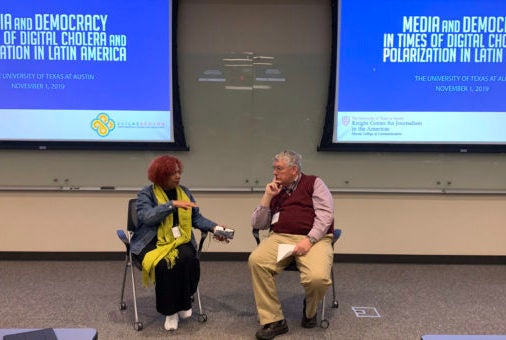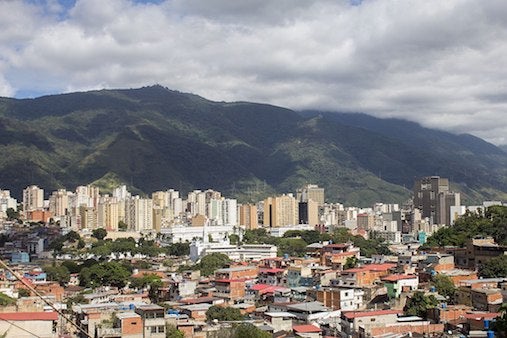
Cartoonist Pedro X. Molina talked about the current political crisis Nicaragua is experiencing and how critical media have become targets in the process. It was part of the event, “Media and Democracy in Times of Digital Cholera and Polarization in Latin America.”

Twenty years ago, journalists could not have imagined the present situation for media in Venezuela, according to Luz Mely Reyes, director and co-founder of digital site Efecto Cocuyo.

At least three media outlets were taken off the air and 14 journalists were hit by pellets, beaten or suffered other aggressions while carrying out their work during a tense day in Venezuela

In Brazil, one of the ten countries with the highest rate of impunity in crimes against journalists worldwide, three bills underway in Congress propose to toughen the criminal treatment of perpetrators of violence against journalists and press professionals.
Carmen Aristegui, one of Mexico’s most well-known journalists, said her country “is experiencing a profound crisis in terms of human rights, including killings and disappearances of journalists and [other] people.”
O Globo, one of Brazil's leading newspapers, penned a historic editorial last Saturday Aug. 31 calling its support for the April 1, 1964 coup that deposed then President João Goulart "a mistake." O Globo, in reference to the June protests across the country that often brought up the newspaper's past relationship to the authoritarian regime, admitted “the hard truth” of its support and billed its change of heart as a response to the “clamor from the street.”
The Supreme Court in Colombia absolved journalist Luis Agustín González on Tuesday, who had been sentenced to prison for the crime of defamation.
Already marked by polarization during the administration of Hugo Chávez, the media environment in Venezuela is now fueling political disputes following the troubled presidential election on April 14, between Chávez's appointed successor, Nicolás Maduro, and opposition candidate Henrique Capriles.
The majority of news outlets in Brazil stay away from the topic of racism, even though they regularly deal with the issue of racial inequality, according to a study conducted by the Institute of Socioeconomic Studies (Inesc) and Andi, a not-for-profit media watchdog.
Internet users and media rights activists in Brazil organized a June 21 marathon of Twitter posts to call for improved infrastructure and expanded access to broadband Internet, Rede Brasil Atual reports. The hashtag #minhainternetcaiu (myinterenetisdown) and the phrase “Broadband is your right!” were both among the most posted topics in Brazil that day, Link do Estadão explains.
The Parliamentary Front for Freedom of Expression and the Right to Communication with Popular Participation was launched by Brazilian lawmakers on April 19, Agência Câmara dos Deputados reports.
The states of Ceará, São Paulo, Mato Grosso, Bahia, Piauí, and Alagoas are considering creating communications monitoring agencies, Folha de S. Paulo and O Globo report.